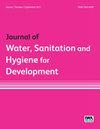马达加斯加通过现场次氯酸钠生产减少腹泻病例
IF 1.4
4区 环境科学与生态学
Q3 WATER RESOURCES
Journal of Water Sanitation and Hygiene for Development
Pub Date : 2023-02-22
DOI:10.2166/washdev.2023.168
引用次数: 0
摘要
马达加斯加东海岸外的圣玛丽岛的学校参加了水、环境卫生和个人卫生(WASH)项目。我们报告了该项目、20所学校可持续获得水处理(WT)与该地区腹泻发病率的影响之间的联系。我们对该计划的可持续性进行了准实验性纵向研究,通过访问使用点(POU)水氯化,安全水储存(SWS)的延续,以及对腹泻儿童的洗手习惯。研究人员查阅了学校附近10个医疗中心的患者档案。次氯酸钠由学生在当地为WT生产,项目的可持续性在2016年至2021年期间实现。干预后,40%的水源被完全取代,60%的水源得到改善。在老师的指导下,一个学生的水俱乐部负责与WT相关的所有活动。参与该计划的学校周围的健康中心发现,2018年至2021年间,腹泻病例下降了58%。腹泻病例的减少与该计划的实施之间似乎存在关联。使用的策略可以复制。然而,该项目的成功是多方面的,取决于社区参与、适应技术、资金和政府支持,以确保可持续性。本文章由计算机程序翻译,如有差异,请以英文原文为准。
Decreasing diarrhea cases through on-site sodium hypochlorite production in Madagascar
Schools from Sainte-Marie Island, off the east coast of Madagascar, participated in water, sanitation, and hygiene (WASH) programs. We report an association between the program, the sustainable access to water treatment (WT) in 20 schools, and the impact on diarrhea incidence in the region. We performed a quasi-experimental longitudinal study on the program's sustainability by accessing the continuation of point-of-use (POU) water chlorination, safe water storage (SWS), and handwashing practices on the diarrhea cases of children. Patient files from 10 health centers near the schools were consulted. Sodium hypochlorite was locally produced by the students for WT and the program's sustainability was accessed between 2016 and 2021. After the intervention, 40% of water sources were entirely replaced and 60% received improvements. A student's water club, guided by teachers, was responsible for all activities related to WT. The health centers around the schools participating in the program saw diarrhea cases drop by 58% between 2018 and 2021. There appears to be an association between a decrease in diarrhea cases and the program's implementation. The strategy used can be replicated. Nevertheless, the program's success is multifactorial, depending on community engagement, adapted technology, funding, and governmental support to ensure sustainability.
求助全文
通过发布文献求助,成功后即可免费获取论文全文。
去求助
来源期刊

Journal of Water Sanitation and Hygiene for Development
WATER RESOURCES-
CiteScore
3.10
自引率
11.80%
发文量
58
审稿时长
16 weeks
期刊介绍:
The Journal of Water, Sanitation and Hygiene for Development is a peer-reviewed journal devoted to the dissemination of high-quality information on the science, policy and practice of drinking-water supply, sanitation and hygiene at local, national and international levels.
 求助内容:
求助内容: 应助结果提醒方式:
应助结果提醒方式:


